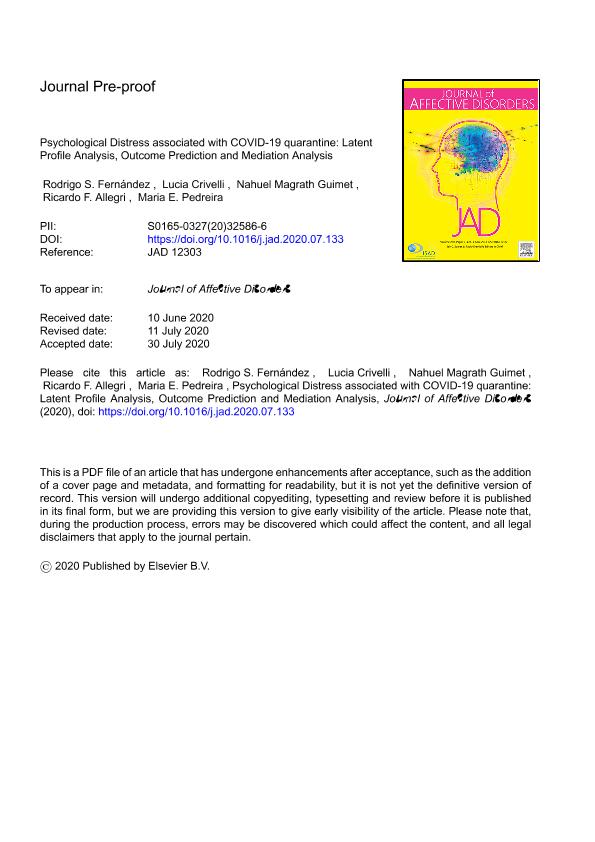Artículo
Psychological distress associated with COVID-19 quarantine: Latent profile analysis, outcome prediction and mediation analysis
Fernández, Rodrigo Sebastián ; Crivelli, Lucía; Guimet, Nahuel Magrath; Allegri, Ricardo Francisco
; Crivelli, Lucía; Guimet, Nahuel Magrath; Allegri, Ricardo Francisco ; Pedreira, Maria Eugenia
; Pedreira, Maria Eugenia
 ; Crivelli, Lucía; Guimet, Nahuel Magrath; Allegri, Ricardo Francisco
; Crivelli, Lucía; Guimet, Nahuel Magrath; Allegri, Ricardo Francisco ; Pedreira, Maria Eugenia
; Pedreira, Maria Eugenia
Fecha de publicación:
12/2020
Editorial:
Elsevier Science
Revista:
Journal of Affective Disorders
ISSN:
0165-0327
Idioma:
Inglés
Tipo de recurso:
Artículo publicado
Clasificación temática:
Resumen
Background Mental health of the population during COVID-19 quarantine could be at risk. Previous studies in short quarantines, found mood-related and anxiety symptomatology. Here we aimed to characterize the subtypes of psychological distress associated with quarantine, assess its prevalence, explore risk/protective factors, and possible mechanisms. Methods Online cross-sectional data (n = 4408) was collected during the Argentine quarantine, between 1st-17th April 2020 along a small replication study (n = 644). Psychological distress clusters were determined using latent profile analysis on a wide-range of symptoms using the complete Brief-Symptom Inventory-53. Multinomial and Elastic-net regression were performed to identify risk/protective factors among trait-measures (Personality and Resilience) and state-measures (COVID-19 related fear and coping-skills). Results Three latent-classes defined by symptom severity level were identified. The majority of individuals were classified in the mild (40.9%) and severe classes (41.0%). Participants reported elevated symptoms of Phobic-Anxiety (41.3%), Anxiety (31.8%), Depression (27.5%), General-Distress (27.1%), Obsession-Compulsion (25.1%) and Hostility (13.7%). Logistic-regressions analyses mainly revealed that women, young individuals, having a previous psychiatric diagnosis or trauma, having high levels of trait-neuroticism and COVID-related fear, were those at greater risk of psychological distress. In contrast, adults, being married, exercising, having upper-class income, having high levels of trait-resilience and coping-skills, were the most protected. Mediation analysis, showed that state-measures mediated the association between trait-measures and class-membership. Conclusions Quarantine was associated intense psychological distress. Attention should be given to COVID-19-related fear and coping-skills as they act as potential mediators in emotional suffering during quarantine.
Archivos asociados
Licencia
Identificadores
Colecciones
Articulos(SEDE CENTRAL)
Articulos de SEDE CENTRAL
Articulos de SEDE CENTRAL
Citación
Fernández, Rodrigo Sebastián; Crivelli, Lucía; Guimet, Nahuel Magrath; Allegri, Ricardo Francisco; Pedreira, Maria Eugenia; Psychological distress associated with COVID-19 quarantine: Latent profile analysis, outcome prediction and mediation analysis; Elsevier Science; Journal of Affective Disorders; 277; 12-2020; 75-84
Compartir
Altmétricas



